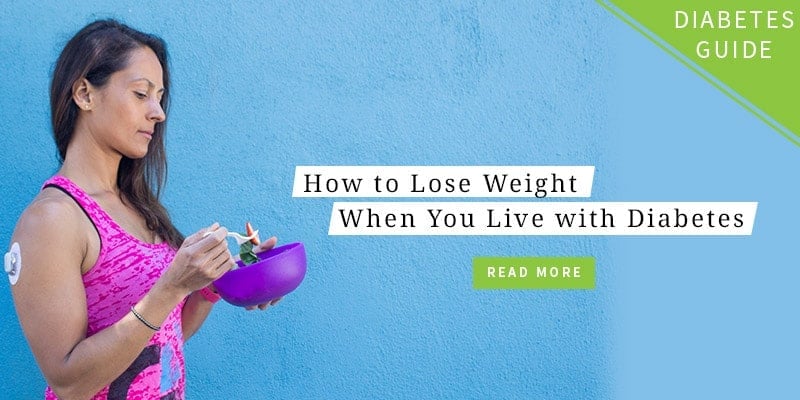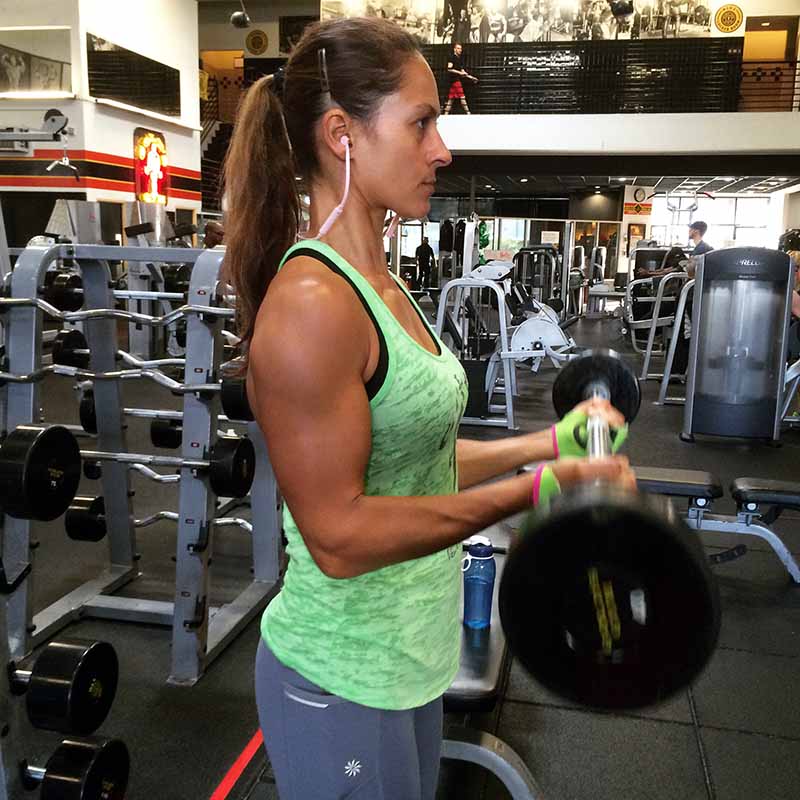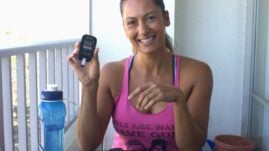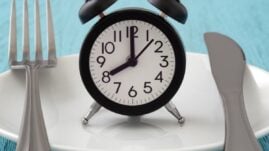Losing weight can be difficult for anyone, and living with type 1 diabetes definitely doesn’t make it easier. However, there ARE people who set out to lose weight and end up so extraordinarily successful that you wonder if they have some inside information you don’t.
That information EXISTS. I’m here to give you the rundown on how to lose weight with type 1 diabetes (actually, most of the advice is relevant for people with any type of diabetes).
Without further ado…let’s GET TO IT!

Temper expectations at the start
Most people have this intense need for instant gratification. They want that 15 lbs gone by yesterday! While I’m all for efficiency, I’m going to be short and sweet and show reality with a pop quiz:
True or false: it took more than a week to gain the weight you are trying to lose.
The answer is undeniably “True”. So if it took you X number of months to gain weight, why would it take you a week or two to lose it?
It doesn’t. It takes time and some concerted effort. Don’t expect to lose all of the weight immediately, but know that with proper habit formation and consistency, you WILL see the results you are after.
The general rule for healthy weight loss is to aim for A MAX of 1-2 lbs. per week.
It’s also quite common for people living with diabetes to take as long as 2-3 weeks before seeing any weight loss at all on a new diet.
“Why?” you ask.
Changing caloric intake and workout routines may require a reduction of insulin (or other diabetes medication) as well as diet manipulation, which takes a little trial and error to adjust.
BE PATIENT.
Once the ball is rolling, a slow and controlled weight loss makes it much more likely that the weight will come off and STAY off than if you crash dieted and lost a lot of weight quickly.
To learn more about setting realistic goals, read “How to set Realistic Diabetes and Fitness Goals and Find Your Positive Motivation”.
How many calories should you eat?
Weight loss can be summed up as follows:
Calories in (eating) < Calories out (burning) = weight loss.
From a thermodynamics standpoint, if you are eating fewer calories than you are expending, you should THEORETICALLY lose weight. No system is perfect, but this is the general premise.
However, this whole “eat less than you expend” advice gets blown out of proportion quite often as you see people slashing their diets to nearly nothing or eating just grapefruits all day. This will work in the very short term, but will seriously decrease your metabolism while you mostly lose water weight that will come right back when you finish your diet.
The first step in any weight loss program is, therefore, to calculate how many calories you should eat per day for a healthy weight loss.
Luckily, there is a guide here on Diabetes Strong that explains how to do this in 5 easy steps. So before reading on, please go to “How to Find Your Daily Calorie Need” and calculate your daily calorie need. Then come back here and continue this guide.
How about protein, carbs, and fat?
I’m not going to stand here and tell you that there is only one way to lose weight with type 1 diabetes. I’ve had experience losing weight on a high-carb diet, low-carb diet, and moderate-carb diet.
They’re all predicated on the aforementioned “calories in, calories out” equation.
But, a couple of tips to consider as you plan your diet:
Protein is helpful in satiety AND retaining muscle mass
In other words, protein will help keep you fuller for longer after meals, which is key in a situation where you are eating less than you may be accustomed to normally.
Additionally, when people lose weight, the composition is typically 75% fat and 25% muscle1. However, a higher protein diet has been linked to a reduction in the amount of muscle lost during a caloric deficit.2
I could go on and on all day, but I’ll leave you with this:
Recommendation: Aim to eat 0.5-0.8 grams per pound of bodyweight per day. It will help you keep your hard-earned muscles while losing weight. So if you weight 200 pounds (91 kg), you should aim for 100-160 grams of protein per day.
Note: If you suffer from kidney disease or have any history of kidney problems, increasing your protein intake may not be recommended.3 Always consult your medical team before making major dietary changes.
Carbs and Fat are FRIENDS (and food)
So many people fear fat and carbs. It is too bad people won’t give them a chance and get to know them…
…and recognize that there is NOTHING scary about them, they deliver a great deal of benefits, and they are delicious!
Carbs are great for those quick bursts of energy you need during a workout. They also provide fiber, which is critical for digestive health and increasing satiety.
Fat will come in handy during a long, sustained workout as the primary energy source. Fat also provides omega-3s, which are useful for anti-inflammatory effects as well as visual acuity, and additionally is the building block for hormones, like testosterone and estrogen.
The keys are the sources from which you get them. Try to stick to the whole food, lesser processed varieties of fat and low-glycemic carbs, rather than the Frankenfoods that have been sitting on the shelf at the grocery store for ages.
The other key is HOW MUCH of each to eat.
At the end of the day, it truly comes down to what works best for you and your blood sugar management. Maybe fewer carbs work for you but more carbs work for me.
But, after determining calorie and protein needs, try to partition the remaining calories pretty evenly for fat and carbs.
For example, if your calorie requirement is 2000 per day and your protein needs require 800 calories, try to split the remaining 1200 calories evenly between fat and carbs (600 calories each) and work from there to determine the optimal amount for you and your goals.

Exercise is great, but nutrition is the key
Raise your hand if you’ve heard the saying “You can’t out-train a bad diet.”
Maybe you’ve heard it, maybe not. Either way, it is very true. It’s really difficult to overcome a poor nutritional intake. Really, REALLY difficult.
Don’t get me wrong. Exercise is CRUCIAL for a healthy lifestyle and for a successful weight loss initiative. It provides a ton of benefits that otherwise wouldn’t be attainable. But, in isolation, exercise alone will not result in as much weight loss as dieting will.4
However, what if we…dare I say it…utilize BOTH?
Both anecdotally and in the research, combining diet and exercise will result in the best outcomes while also setting you up for sustained success, as ideally, this weight loss should kick off a lifestyle change.
How much should you exercise, and what type of exercise?
If you are just starting out, you don’t want to go from 0 to 100 real quick, because you may burn out or get discouraged. I recommend a combination of resistance training and cardiovascular training for optimal results.
People overlook resistance training in the context of weight loss. This is what is going to help you KEEP your hard-earned muscle mass during the calorie reduction.
Guess what?
That muscle mass will keep your metabolism firing. Your metabolism firing means you’ll burn more calories ALL the time, working out or not!
Combine this with some form of cardiovascular training multiple times a week for 20 minutes – get creative here and find something you enjoy – and you’ve got a recipe for success on the exercise front.
I love insulin…and you should too
When people first are diagnosed with type 1 diabetes, they typically start taking insulin. When they start insulin, they typically gain weight. Therefore, insulin is often associated with weight gain.
Insulin is necessary for people with type 1 diabetes to live. You already know this.
What you probably don’t realize, however, is that insulin is not what is causing weight gain. What causes weight gain is a hamster wheel of blood sugar control issues:
Low blood sugar → correct with carbs (aka calories) → overcorrecting leading to a high blood sugar and a correction bolus → too much insulin → low blood sugar…
The cycle is like a roller coaster that you just can’t get off, seemingly forever. You’re eating more calories than expected for your goals, and suddenly, BAM! There are a few pounds you did not plan to gain, or your weight loss goals derailed.
Yes, insulin is a part of the equation, but not THE WHOLE equation.
I get it: low blood sugars can be tough, and some of them make you want to eat the whole fridge. But, for lows and weight loss, consider the following idea:
- Keep a “carb/calorie reserve” for lows. If your calorie goal is 2000 per day, consider eating 1900 and leaving those last 100 calories for treating lows. If you end up low, you’ve already built it into your goal as opposed to exceeding it.
- See your blood sugar trending downwards? Consider a decreased temporary basal insulin (if you use an insulin pump). The exact amount for basal decrease is determined through trial and error, but it could ultimately lead to fewer calories consumed to treat your low.
All in all, don’t worry about how much insulin you’re using – worry about keeping your blood sugars in great control and preventing lows, and the insulin amount will take care of itself.
To learn more about the best ways to treat lows, read “How to Treat a Low Blood Sugar (Without Eating Everything in Sight)”.
Summary
This journey may seem daunting, but just remember, slow and steady wins the race. Develop good, healthy habits with diet and exercise, focus on optimal blood sugar control, and stick to your calorie goal – the rest will all fall into place.
To lose weight with type 1 diabetes:
- Set realistic goals
- Calculate your daily calorie need and create a calorie deficit
- Consume enough protein and split remaining calories between carbs and fat
- Perform a combination of resistance and cardiovascular training
- Don’t be afraid of insulin. It doesn’t cause weight gain
- Strive to maintain good glycemic levels and have a plan for dealing with lows without over-eating
- Be patient! Healthy and sustainable weight loss takes time
You got this!





corlis watkins
Thank you all for your posts! I am t2 and struggle with weight issues all my life. Even when I was not diabetic. As young as 10yrs old. I think the yo yo dieting throughout my life contributed to the diabetes. There is no doubt in my mind that high blood pressure medication causes it and if not causes it pushes you into it faster. I recently started taking a new BP med in May and every since then I have been having high sugars and feel for the first time since I have been diabetic that I may have to go on medication for the diabetes. I have been controlling my diabetes with diet and exercise and keeping my A1c at 6.5. I can not stop the medication but I am requesting my doctor find me another one. I wish I had did more strength training because my muscles a mushy and flabby. At 62 it will be even harder to build muscle. Since my yo yo dieting I need even fewer calories in order to lose weight than the calculator says I require. Thank you for this very informative article.
Christel Oerum
you’re welcome, I’m glad it’s helpful. And you can build muscles no matter what age you start. I hope you’ll enjoy getting into resistance training (it’s no secret that it’s my favorite form of exercise)
DENNIS MORAN
SOUNDS DEPRESSED? I DO NOT KNOW HER AGE. BOYFRIEND ISSUES? GET HER INTO DANCE, ZUMBA, YOGA PILATIES, ROLLER OR INLINE SKATING, SKATEBOARDING OR SWIMMING.MAYBE ROCK CLIMBING, OR HIKING. A VARIETY OF EXERCISING. MAYBE WITH NEW FRIENDS THAT MIGHT CHALLENGE HER. AND IN MASTERING SOME OF THESE. HER IMAGE OF HERSELF AND CONFIDENCE MIGHT CHANGE. GOOD LUCK.
Tristen
I’m confused as to how you have to “manage your weight” when you have Tye One Diabetes. That’s for type 2 right? Because obese and people that don’t eat right have type 2. So you’re telling me you can cure type one diabetes by working out?
Christel Oerum
At this time there is no cure for Type 1 diabetes. Everyone, regardless of type of diabetes or if they have diabetes at all, can benefit from managing their weight. Not everyone living with type 1 diabetes is at a healthy weight. This article is meant to act as a guide for those living with type 1 diabetes who struggle or just need a little guidance as to how they can lose weight in a healthy manner
steve shay
I am 5’9″ and weigh 155 pounds. For me there is no relationship between high blood sugar problems and weight.
Lili
Intermittent fasting is more than caloric deficit, what helps me is the timing. I’m disciplined and can restrict calories without IF. What IF does is not just create a window but it also affects your insulin sensitivity. It changes up the insulin equation. IF equals higher insulin sensitivity. Higher insulin sensitivity equals less insulin. Less insulin equals weight loss. It irks me when people say all IF does is make you eat less. It doesn’t, I probably eat more it’s just the matter of I don’t need as much insulin and my body becomes trained to live off fat not sugar. And also a huge factor is the quality of your calories during the feeding window. Make sure they come from high quality fats like avocado and nuts; avoid processed sugars completely. A ketogenic diet along with IF has been a big help for me in losing fat. I’ve been type 1 since 2005 and one of the things I just realized at the beginning of 2019 is that I was not eating logically. I would take insulin to eat certain foods that I was told were healthy for me. Looking back at that way of thinking it would be like telling someone with a peanut allergy to eat peanuts because you were standing by with an EpiPen. As a type 1 I realized my body does not handle sugar as a non diabetic it’s better for me to avoid it if possible.
Christel Oerum
I’m so glad to hear that you’ve found a way of eating that works for you and your diabetes, that’s amazing. And I understand why you’d want others to be as successful as you are. IF won’t work for everyone in the same way it works for you though. Some actually see an increase in insulin needs as the fasting makes their stress hormones increase.
As for whether IF makes you lose weight, I do believe it will always come down to a calorie deficit. You just can’t lose weight being in a calorie surplus no matter what diet you’re on. The research on the benefits of IF is not exactly conclusive but a recent meta-analysis does indicate that it could be helpful
Shai
Hi Lili, sounds great. how do you structure your IF? Thanks
Lucinda
I have been Type 1 since 1958; diagnosed at 11 years old. I am now 72 and do not suffer from any complications so am obviously very diligent with my diet and exercise. The past 61 years have been challenging but am proud of my achievements of no complications; however this is the first time i am unable to lose weight. I do both cardio and strength training but my weight does not budge. I only need to lose about 12 pounds and am terribly discouraged. Any ideas other than intermittent fasting which dos not appeal to me at all but my endocrinologist said some of his other diabetic patients have found success.
Christel Oerum
What makes it so hard now might be your age rather than diabetes. Unfortunately, weight management does get harder as we get older. Sounds like you’re doing the right things (love that!), so what I’d recommend is tracking and keeping a keen eye on your diet. If you’re to lose weight you need to consistently be in a calorie deficit. And I’d say all that intermittent fasting do is reduce your “eating window” which for some means they don’t get to eat as much and therefore ends up in a calorie deficit.
DENNIS MORAN
I HAVE BEEN A TYPE I SINCE 2000 AT AGE 42. I GAINED 35 POUNDS IN THE FIRST 10 YEARS. DESPITE EATING HEALTHY AND WORKING OUT. REASON …I NOW SIT BEHIND A DESK. NOW WHAT HELPED ME LOSE THE WEIGHT OVER TWO YEARS. INSTEAD OF EATING AT 7AM I STARTED EATING AT 9AM. SKIPPING LUNCH. AND HAVING DINNER AT FIVE PM. NO FOOD FOR SIXTEEN HOURS. ONLY WATER. ALSO I CHANGED MY DAILY WORK OUT FROM THE EVENING AFTER DINNER TO THE MORNING BEFORE BREAKFAST. HARD AT FIRST BUT WORKED LIKE MAGIC.
Risa RN CDE
I am a diabetes professional – I work at a Diabetes Education Centre within our Health Authority and in general I really appreciate the information and the spirit in which the article is written. We all want a magical bullet for weight whether we have diabetes or not. There really isn’t one – it’s about healthy eating and moving around, the diabetes just adds another layer of management on top. I take a bit issue with the reference to the protein and kidney function section and the cited references – one of which is from 1999. If it was a person it could vote and buy alcohol – in Canada. 🙂 High intake of protein in healthy individuals in the short term appears to have little effect but it’s unknown what damage long term use could have AND considering that those with diabetes are at higher risk of kidney disease it seems like something you may not want to play around with. If it was me, I wouldn’t be going on a high protein diet and I wouldn’t advise me patients to do so either. https://www.ncbi.nlm.nih.gov/pmc/articles/PMC5962279/
Christel Oerum
Thank you for bringing that to our attention. We reviewed the wording and sources and updated the text. The text has been updated.
lorraine
Would you recommend an energy drink-Lucozade-to drink while at the gym? My sugars drop quite rapidly while doing cardio and I just think I should give up. Surely any good I’m doing is lost when I have to eat immediately after!!
Christel Oerum
There are two ways to reduce the risk of lows during activity, increase your carbs or adjust your insulin. Unless you’re doing endurance sports I generally recommend adjusting your insulin. More on how to do that HERE and HERE
Kathy L Gause
I tried to calculate my calorie needs and it is way too high. I think what may be missing is “ideal weight”. I get different target calories to reach my goal weight between 1300 and 1900. I just quit paying attention and am sticking to the carbs,fat,protein combinations my dietician came up with. Most days it works and I don’t feel hungry and am losing weight at a good rate. I just run out if ideas because I am a picky eater.
Christel Oerum
Definitely stick to what your medical team suggests. Online calculators will give you an estimate but working directly with someone such as your dietician will help you dial in your calorie needs much faster
Type 1 Diabetic on Insulin Pump
Hi, I’ve had T1D since 1991. Even though I have had it so many years, I’m still struggling with it. My biggest problem is that I forget to bolus before meals( I have a Insulin pump). My numbers are all over the place. I’m so stressed out over just having diabetes. Sometimes I wonder am I ever going to get this part of my life under control. I need someone I can talk to who has Type 1 Diabetes who is going through it just like me. Any suggestions??? Thank you.
Christel Oerum
There are different options for meeting others living with type 1. You can find some great online groups and forums. Our Diabetes Strong Community on Facebook is one option. Many diabetes organizations also have meetups and local resources. There are also support groups such as Diabetes Sisters (US and female only), as well as Meetup.com. But you have to go online and do some digging
Jim
Hang in there and don’t give up. I’ve been a type 1 brittle for 42 years. I was diagnosed in 1977 when there was nothing but pork or beef insulin available. Staying on top of your blood sugar is tough. One of my doctors several years ago let me in on a big secret. He told me that if he is treating someone with a thyroid problem he sets the dose and the patient has to follow it to keep their thyroid in check kind of like a judge passing sentence. With diabetes it’s a whole different story. Both the doctor and the patient have to keep track. The doctor does his math and comes up with a basal rate, unit carb sensitivity and the such to program your pump, but just remember this is a starting point. You are the one who will have to live this life everyday so be sure to keep good notes on what and how much you eat, your bs levels, exercise, if you get sick and don’t be afraid to tell them anything that might be affecting what’s going on with you. I can tell you that my A1C is not perfect and has only been “ok” a handful of times but that has not stopped me from living my life. Hang in there and don’t give up. Always remember this-
A life with Type 1 diabetes is tough so be tougher.
DENNIS J MORAN
I GOT A C.G.L. AND GOT RID OF THE PUMP. TOO MUCH AGGRAVATION. THE PEN WORKS JUST FINE. AND WE ALL FORGET. THE CGL DOES NOT AND GIVES YOU THE NOTIFICATION OF HIGHS AND LOWS. AND YOU CAN KEEP YOUR LEVELS JUST AS TIGHT. BUT NOW YOU HAVE MUCH MORE FREEDOM
Gary
What is a CGL?
Leslie Yeager
I suspect he means CGM (continuous glucose monitor).